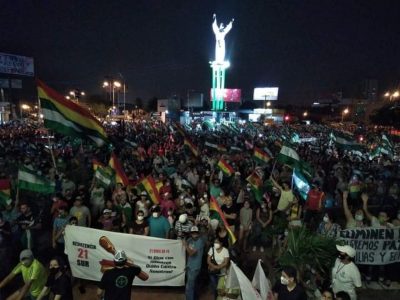Tensions Grow in Bolivia as Arce’s Inauguration Day Approaches

Arce’s victory was not enough to overcome the effects of the coup in Bolivia. Currently, the country is strongly threatened by the confluence of the anti-democratic interests of various political groups, paramilitaries and religious fundamentalists who seek to prevent the inauguration of the new government, scheduled for November 8. Institutionally, there is no doubt about the validity of Arce’s victory, which has already been confirmed by the Bolivian Electoral Court, but even so, several groups continue to question the procedure. Day after day, new allegations of fraud and all sorts of accusations arise, even without any material evidence.
As expected, the core of criticism against the electoral process comes from the city of Santa Cruz, a fortress of the Bolivian far right and where the articulations that led to the overthrow of Evo Morales originated last year. In Santa Cruz, the demonstrations have already started, and the agenda is just one: that the elections be annulled. With this goal, the demonstrators have hardened their speech and called on the Bolivian Armed Forces to intervene.
On the evening of November 2, at a meeting, the Cruceñista Youth Union (UJC) – a Santa Cruz-based far-right paramilitary group – decided to completely ignore the election results, demanding a “citizen, military and police audit” of the current Bolivian electoral situation. UJC is one of the most violent political groups in Latin America, having carried out beatings and murders during the protests against Evo Morales last year. In addition to calling on the military to “put order in the country”, UJC militants are blocking roads and various strategic locations in the country with the aim of causing chaos and instability – in short, the strategy is to generate social disorder to justify the necessity of military intervention – which will seem to be the only possible way out.
However, now the problem goes beyond UJC: some retired military personnel have recently come together to form active political groups, characterized by common agendas with the UJC, such as policy of alignment with the US, economic liberalism and racism against indigenous people. These military nuclei currently ask Añez to refuse to pass the position to Arce. Although Arce’s victory was recognized, Añez and her ministers made no public response to repudiate the requests they have been receiving from extremist groups, which raises great concerns, considering that such proclamations are truly illegal acts and the silence of the president may, for some analysts, indicate some type of conspiracy or collusion with an attempted coup.
Some religious groups have also joined the movement against Arce. Representatives of the Bolivian Catholic community spoke during a public hearing on October 18 questioning the outcome of the elections. In addition, neo-Pentecostal groups have traditionally opposed the Bolivian political left and these groups are now gaining prominence in protests against Arce. Religious fundamentalists have been associated with the Bolivian coup since the initial articulations and continue to be an essential part of the political right in the country, having a strong influence on popular unrest.
Given this scenario, it is important to remember that in July there was a serious confrontation between the government and the parliament in Bolivia. The crisis was due to the fact that Añez proposed to promote some generals of the Army without the approval of the Parliament, which caused great agitation among the senators. At the time, the Commander of the Armed Forces, General Sergio Orellana, in an act of insubordination, demanded that the senators approve the list of promotions within a maximum period of one week. Añez remained silent and did not disapprove of the military’s attitude, so, under violent coercion, the senators approved the list.
The Bolivian constitution completely vetoes the possibility for the government to unilaterally promote army and police generals, so the current commanders of the armed forces have been appointed illegally. This is important to consider because it shows, in addition to the chaotic state of the Bolivian legal order, an evidence of real collusion between Añez and the current generals. This, combined with the fact that the government remains silent in the face of the violent acts of the UJC and other extremist groups, leads us to question: Will Añez really accept the democratic decision or do we have another coup on the way?
The next few days will be tense. Probably, the protests will increase exponentially the Bolivian streets will be marked by the confrontation between supporters and opponents of Arce. In addition to the mere inauguration, it remains to be seen what the Arce government will be like in the face of so much pressure and violence. Will Arce be able to rule?
*
Note to readers: please click the share buttons above or below. Forward this article to your email lists. Crosspost on your blog site, internet forums. etc.
This article was originally published on InfoBrics.
Lucas Leiroz is a research fellow in international law at the Federal University of Rio de Janeiro.
Featured image is from InfoBrics

